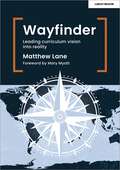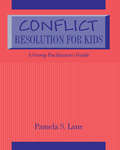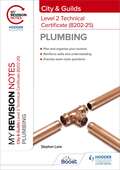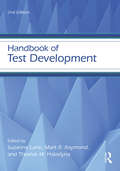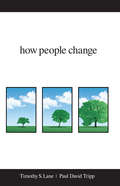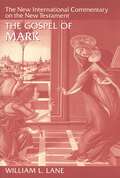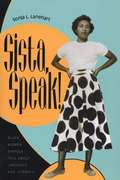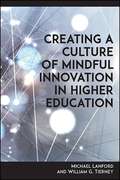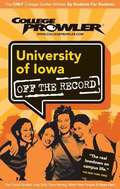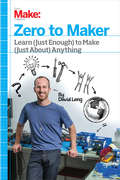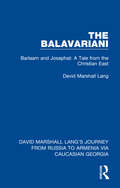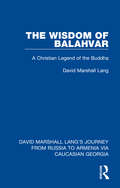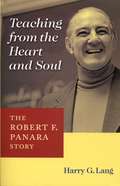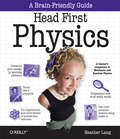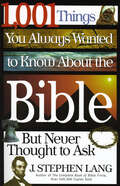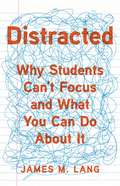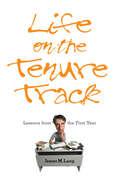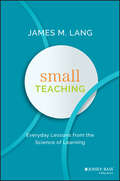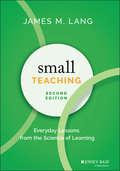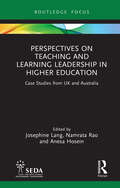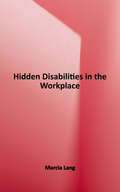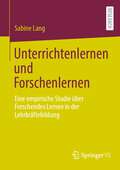- Table View
- List View
Wayfinder: Leading curriculum vision into reality
by Matthew LaneWayfinder: Leading curriculum vision into reality offers a clear framework and method for school leaders to support long lasting curriculum change that is successful and positive for staff and students.Drawing on a decade of experience of leadership in schools and the armed forces, Matthew Lane guides us through the foundational knowledge to be a successful leader of change. Building on this, we walk through a step-by-step model of delivering change, with classroom examples, and based upon the best research in the field. Covering fields as diverse as design testing, overcoming resistance to change, and using coaching to support staff, Wayfinder is your indispensable guide and framework to leading curriculum change. Whether you are a new subject lead or an experienced headteacher, this is your essential guide to leading and delivering curriculum change.
Conflict Resolution For Kids: A Group Facilitator's Guide
by Pamela S. LaneProviding a format for a conflict resolution children's group, this guide is invaluable for the group facilitator - the teacher or counsellor in a school or mental health residential treatment program. It explores theoretical background in facilitating a children's group, and includes numerous activities and concrete tools for implementation of a group process lab. Co-operative learning activities provide task-orientated "ah- ha!" experiences for children working on their interpersonal and problem- solving skills.; Appropriate for use with children in grades K-6, it is also useful as a supplemental textbook in school counsellor education curriculum.
My Revision Notes: City & Guilds Level 2 Technical Certificate in Plumbing (8202-25)
by Stephen LaneUnlock your full potential with this revision guide that will guide you through the content and skills you need to succeed in the City & Guilds Level 2 Technical Certificate in Plumbing (8202).- Plan your own revision and focus on the areas you need to revise with key content summaries and revision activities for every topic- Understand key terms you will need for the exam with user-friendly definitions and a glossary- Breakdown and apply scientific and mathematic principles with clear worked examples- Use the exam tips to clarify key points and avoid making typical mistakes- Test yourself with end-of-topic questions and answers and tick off each topic as you complete it- Get ready for the exam with tips on approaching the paper, and sample exam questions----'A great idea and a great addition for the students. It is difficult enough to encourage the students to do their own notes for revision but the My Revision Notes book is a very good start to the process and a means to them using the guidance in preparing for their exams.' -- Mike Line, Programme Manager Plumbing and Gas, Leicester College
My Revision Notes: City & Guilds Level 2 Technical Certificate in Plumbing (8202-25)
by Stephen LaneUnlock your full potential with this revision guide that will guide you through the content and skills you need to succeed in the City & Guilds Level 2 Technical Certificate in Plumbing (8202).- Plan your own revision and focus on the areas you need to revise with key content summaries and revision activities for every topic- Understand key terms you will need for the exam with user-friendly definitions and a glossary- Breakdown and apply scientific and mathematic principles with clear worked examples- Use the exam tips to clarify key points and avoid making typical mistakes- Test yourself with end-of-topic questions and answers and tick off each topic as you complete it- Get ready for the exam with tips on approaching the paper, and sample exam questions----'A great idea and a great addition for the students. It is difficult enough to encourage the students to do their own notes for revision but the My Revision Notes book is a very good start to the process and a means to them using the guidance in preparing for their exams.' -- Mike Line, Programme Manager Plumbing and Gas, Leicester College
Handbook of Test Development (Educational Psychology Handbook)
by Suzanne Lane Mark R. Raymond Thomas M. HaladynaThe second edition of the Handbook of Test Development provides graduate students and professionals with an up-to-date, research-oriented guide to the latest developments in the field. Including thirty-two chapters by well-known scholars and practitioners, it is divided into five sections, covering the foundations of test development, content definition, item development, test design and form assembly, and the processes of test administration, documentation, and evaluation. Keenly aware of developments in the field since the publication of the first edition, including changes in technology, the evolution of psychometric theory, and the increased demands for effective tests via educational policy, the editors of this edition include new chapters on assessing noncognitive skills, measuring growth and learning progressions, automated item generation and test assembly, and computerized scoring of constructed responses. The volume also includes expanded coverage of performance testing, validity, fairness, and numerous other topics. Edited by Suzanne Lane, Mark R. Raymond, and Thomas M. Haladyna, The Handbook of Test Development, 2nd edition, is based on the revised Standards for Educational and Psychological Testing, and is appropriate for graduate courses and seminars that deal with test development and usage, professional testing services and credentialing agencies, state and local boards of education, and academic libraries serving these groups.
How People Change: How Christ Changes Us By His Grace (Vantage Point Book Ser.)
by Timothy S. Lane Paul David TrippA changed heart is the bright promise of the gospel.When the Bible talks about the gift of a new heart, it doesn't mean a heart that is immediately perfected, but a heart that is capable of being changed. Jesus' work on the cross targets our hearts, our core desires and motivations, and when our hearts change, our behavior changes. It's amazing to watch people who once seemed stuck in a pattern of words, choices, and behaviors start living in a new way as Christ changes their hearts.
The Gospel of Mark (New International Commentary on the New Testament (NICNT))
by William L. LaneThis widely praised commentary by William Lane shows Mark to be a theologian whose primary aim was to strengthen the people of God in a time of fiery persecution by Nero. Using redaction criticism as a hermeneutical approach for understanding the text and the intention of the evangelist, Lane considers the Gospel of Mark as a total literary work and describes Mark's creative role in shaping the Gospel tradition and in exercising a conscious theological purpose.Both indicating how the text was heard by Mark's contemporaries and studying Mark within the frame of reference of modern Gospel research, Lane's thoroughgoing work is at once useful to scholars and intelligible to nonspecialists.
Sista, Speak!: Black Women Kinfolk Talk about Language and Literacy
by Sonja L. LanehartThe demand of white, affluent society that all Americans should speak, read, and write "proper" English causes many people who are not white and/or middle class to attempt to "talk in a way that feel peculiar to [their] mind," as a character in Alice Walker's The Color Purple puts it.<P><P> In this book, Sonja Lanehart explores how this valorization of "proper" English has affected the language, literacy, educational achievements, and self-image of five African American women--her grandmother, mother, aunt, sister, and herself.<P>Through interviews and written statements by each woman, Lanehart draws out the life stories of these women and their attitudes toward and use of language. Making comparisons and contrasts among them, she shows how, even within a single family, differences in age, educational opportunities, and social circumstances can lead to widely different abilities and comfort in using language to navigate daily life. Her research also adds a new dimension to our understanding of African American English, which has been little studied in relation to women.
Creating a Culture of Mindful Innovation in Higher Education
by Michael Lanford William G. TierneyHigher education institutions have traditionally nurtured artistic and scientific development and served as catalysts for innovative ideas and products. However, contemporary discourse too often relegates the concept of innovation to the private sector, where the rhetoric of "disruption" frequently reduces innovation to economic terms. As a result, innovations that could benefit society instead exacerbate existing inequities, and the environmental factors that stimulate long-term innovative progress are neglected. Creating a Culture of Mindful Innovation in Higher Education offers a different vision by identifying the conditions that enable college and university administrators, faculty, and staff to promote an innovative institutional culture. Mindful innovation is defined through six central tenets: societal impact; the necessity of failure; creativity through diversity; respect for autonomy and expertise; thoughtful consideration for the dimensions of time, efficiency, and trust; and the incentivization of intrinsic motivation and progress over scare tactics and disruption. Michael Lanford and William G. Tierney offer a clearheaded analysis of the challenges and opportunities in creating a culture of mindful innovation and argue that the institutions that do so will be poised to lead entrepreneurial endeavors, scientific progress, and greater social equity in the twenty-first century.
University of Iowa (College Prowler)
by Alexander LangNo university affiliations. No half-truths. No out-of-touch authors who haven't been in school for decades. A class project turned company, College Prowler produces guidebooks that are written by actual college students and cover the things students really want to know. Unlike other guides that jam everything into a five-pound book and devote only two pages to each college, our single-school guidebooks give students only the schools they want and all the information they need. From academics and diversity to nightlife and sports, we let the students tell it how it is. In addition to editorial reviews and grades for 20 different topics, more than 80 percent of each guide is composed of actual student reviews of their school. Whether readers are looking for "Best and Worst" lists, "Did You Knows?" or traditions, College Prowler guides have it all. Our books are the only place for local slang, urban legends, and tips on the best places to find a date, study, or grab a bite to eat.
Zero to Maker
by David LangAre you possessed by the urge to invent, design, and make something that others enjoy, but don't know how to plug into the Maker movement? In this book, you'll follow author David Lang's headfirst dive into the Maker world and how he grew to be a successful entrepreneur. You'll discover how to navigate this new community, and find the best resources for learning the tools and skills you need to be a dynamic maker in your own right. Lang reveals how he became a pro maker after losing his job, and how the experience helped him start OpenROV--a DIY community and product line focused on open source undersea exploration. It all happened once he became an active member of the Maker culture. Ready to take the plunge into the next Industrial Revolution? This guide provides a clear and inspiring roadmap. Take an eye-opening journey from unskilled observer to engaged maker-entrepreneur Enter the Maker community to connect with experts and pick up new skills Use a template for building a maker-based entrepreneurial lifestyle Learn from the organizer of the first-ever Maker Startup Weekend Be prepared for exciting careers of the future
The Balavariani: Barlaam and Josaphat: A Tale from the Christian East (David Marshall Lang's Journey from Russia to Armenia via Caucasian Georgia #2)
by David Marshall LangOriginally published in 1966, the full Georgian text of the oldest version of this Christian version of this matchless classic of Oriental wisdom literature is made accessible to a wider readership in an English translation. Based on a unique manuscript preserved in the Greek Patriarchate at Jerusalem, this rendering should appeal to those interested in comparative religion, Buddhism, medieval Christianity, the history of monasticism and in the literature of the Georgians and other ancient nations of the former Soviet Union.
The Wisdom of Balahvar: A Christian Legend of the Buddha (David Marshall Lang's Journey from Russia to Armenia via Caucasian Georgia #3)
by David Marshall LangOriginally published in 1957 and forming a companion volume to The Balavariani, this volume provides valuable research into the biography of Gautama Buddha and its influence on medieval Christian thought. This work, the romance of Barlaam and Josaphat, was included by Caxton in The Golden Legend and inspired the episode of the Caskets in Shakespeare’s The Merchant of Venice; its heroes were venerated as Saints. Over a century ago, however, the legend was finally identified as an adaptation of episodes from the life and ministry of the Buddha. The first part of the book is devoted to tracing the development and migration of the Barlaam and Josaphat legend from its original Buddhist environment to the West. The second part is a translation of the Georgian text – the first published in any Western European language. The volume therefore gives one of the oldest Near Eastern versions of the story.
Teaching from the Heart and Soul: The Robert F. Panara Story
by Harry G. LangThe Sixth Volume in the Deaf Lives Series Robert F. Panara lost his hearing from spinal meningitis in 1931 at the age of ten. However, he could read and write, and with his friends' help, Bob (as he was known), made it through high school. His new solitude created a new passion - reading, reading, and reading. The stage was set for the emergence of one of the great deaf educators in modern time, a life fully captured in Harry G. Lang's Teaching from the Heart and Soul: The Robert F. Panara Story. Bob Panara's many achievements began after his discovery of Gallaudet College in the 1940s. There, he wrote "The Significance of the Reading Problem," which first expressed his belief that teaching "comes from the heart and soul." The article secured him his first job at the New York School for the Deaf in White Plains. Bob returned to teach at Gallaudet College from 1948 until 1965, when he left to help found the National Technical Institute for the Deaf (NTID) and the National Theatre of the Deaf (NTD) -- all in the same year. He continued to expand arts and literature at NTID until his retirement in 1987. Bob Panara's genius resides in the people he inspired with his vivacious teaching style. He believed ardently in involving students, that they should "be the book." Former students tell story after story about his fabulous interpretations of drama and poetry, a legacy confirmed by his own story in Teaching from the Heart and Soul.
Head First Physics: A learner's companion to mechanics and practical physics (AP Physics B - Advanced Placement) (Head First)
by Heather LangWouldn't it be great if there were a physics book that showed you how things work instead of telling you how? Finally, with Head First Physics, there is. This comprehensive book takes the stress out of learning mechanics and practical physics by providing a fun and engaging experience, especially for students who "just don't get it."Head First Physics offers a format that's rich in visuals and full of activities, including pictures, illustrations, puzzles, stories, and quizzes -- a mixed-media style proven to stimulate learning and retention. One look will convince you: This isn't mere theory, this is physics brought to life through real-world scenarios, simple experiments, and hypothetical projects. Head First Physics is perfect for anyone who's intrigued by how things work in the natural world. You'll quickly discover that physics isn't a dry subject. It's all about the world we live in, encompassing everything from falling objects and speeding cars, to conservation of energy and gravity and weightlessness, and orbital behavior. This book:Helps you think like a physicist so you can understand why things really work the way they do Gives you relevant examples so you can fully grasp the principles before moving on to more complex concepts Designed to be used as a supplement study guide for the College Board's Advanced Placement Physics B Exam Introduces principles for the purpose of solving real-world problems, not memorization Teaches you how to measure, observe, calculate -- and yes -- how to do the math Covers scientific notation, SI units, vectors, motion, momentum conservation, Newton's Laws, energy conservation, weight and mass, gravitation and orbits, circular motion and simple harmonic motion, and much more If "Myth Busters" and other TV programs make you curious about our physical world -- or if you're a student forced to take a physics course -- now you can pursue the subject without the dread of boredom or the fear that it will be over your head. Head First Physics comes to rescue with an innovative, engaging, and inspirational way to learn physics!
1,001 Things You Always Wanted to Know About the Bible, But Never Thought to Ask
by J. Stephen LangWith 1,001 Things You Always Wanted to Know About the Bible but Never Thought to Ask discover how the Bible has impacted language, U.S. history, worship, music, art, literature, movies, and theater; how the Bible was passed down to us; plus every key person, place, event, and idea in the Bible. Best-selling Bible trivia author J. Stephen Lang's intriguing tidbits will leave you yearning to know more about the world's most fascinating book. Whether you are a seasoned Bible student or just getting started, you will enjoy readying 1,001 Things You Always Wanted to Know About the Bible but Never Thought to Ask.
Cheating Lessons: Learning from Academic Dishonesty
by James M. LangNearly three-quarters of college students cheat during their undergraduate careers, a startling number attributed variously to the laziness of todays students, their lack of a moral compass, or the demands of a hypercompetitive society. For James Lang, cultural or sociological explanations like these are red herrings. His provocative new research indicates that students often cheat because their learning environments give them ample incentives to try--and that strategies which make cheating less worthwhile also improve student learning. "Cheating Lessons "is a practical guide to tackling academic dishonesty at its roots. Drawing on an array of findings from cognitive theory, Lang analyzes the specific, often hidden features of course design and daily classroom practice that create opportunities for cheating. Courses that set the stakes of performance very high, that rely on single assessment mechanisms like multiple-choice tests, that have arbitrary grading criteria: these are the kinds of conditions that breed cheating. Lang seeks to empower teachers to create more effective learning environments that foster intrinsic motivation, promote mastery, and instill the sense of self-efficacy that students need for deep learning. Although cheating is a persistent problem, the prognosis is not dire. The good news is that strategies which reduce cheating also improve student performance overall. Instructors who learn to curb academic dishonesty will have done more than solve a course management problem--they will have become better educators all around.
Distracted: Why Students Can't Focus and What You Can Do About It
by James M. LangKeeping students focused can be difficult in a world filled with distractions -- which is why a renowned educator created a scientific solution to one of every teacher's biggest problems.Why is it so hard to get students to pay attention? Conventional wisdom blames iPhones, insisting that access to technology has ruined students' ability to focus. The logical response is to ban electronics in class. But acclaimed educator James M. Lang argues that this solution obscures a deeper problem: how we teach is often at odds with how students learn. Classrooms are designed to force students into long periods of intense focus, but emerging science reveals that the brain is wired for distraction. We learn best when able to actively seek and synthesize new information. In Distracted, Lang rethinks the practice of teaching, revealing how educators can structure their classrooms less as distraction-free zones and more as environments where they can actively cultivate their students' attention. Brimming with ideas and grounded in new research, Distracted offers an innovative plan for the most important lesson of all: how to learn.
Life on the Tenure Track: Lessons from the First Year
by James M. LangIn this fast-paced and lively account, Jim Lang asks—and mostly answers—the questions that confront every new faculty member as well as those who dream of becoming new faculty members: Will my students like me? Will my teaching schedule allow me time to do research and write? Do I really want to spend the rest of my life in this profession? Is anyone awake in the backrow?Lang narrates the story of his first year on the tenure track with wit and wisdom, detailing his moments of confusion, frustration, and even elation—in the classroom, at his writing desk, during his office hours, in departmental meetings—as well as his insights into the lives and working conditions of faculty in higher education today. Engaging and accessible, Life on the Tenure Track will delight and enlighten faculty, graduate students, and administrators alike.
Small Teaching
by James M. LangEmploy cognitive theory in the classroom every day Research into how we learn has opened the door for utilizing cognitive theory to facilitate better student learning. But that's easier said than done. Many books about cognitive theory introduce radical but impractical theories, failing to make the connection to the classroom. In Small Teaching, James Lang presents a strategy for improving student learning with a series of modest but powerful changes that make a big difference--many of which can be put into practice in a single class period. These strategies are designed to bridge the chasm between primary research and the classroom environment in a way that can be implemented by any faculty in any discipline, and even integrated into pre-existing teaching techniques. Learn, for example: How does one become good at retrieving knowledge from memory? How does making predictions now help us learn in the future? How do instructors instill fixed or growth mindsets in their students? Each chapter introduces a basic concept in cognitive theory, explains when and how it should be employed, and provides firm examples of how the intervention has been or could be used in a variety of disciplines. Small teaching techniques include brief classroom or online learning activities, one-time interventions, and small modifications in course design or communication with students.
Small Teaching: Everyday Lessons from the Science of Learning
by James M. LangA freshly updated edition featuring research-based teaching techniques that faculty in any discipline can easily implement Research into how we learn can help facilitate better student learning—if we know how to apply it. Small Teaching fills the gap in higher education literature between the primary research in cognitive theory and the classroom environment. In this book, James Lang presents a strategy for improving student learning with a series of small but powerful changes that make a big difference―many of which can be put into practice in a single class period. These are simple interventions that can be integrated into pre-existing techniques, along with clear descriptions of how to do so. Inside, you’ll find brief classroom or online learning activities, one-time interventions, and small modifications in course design or student communication. These small tweaks will bring your classroom into alignment with the latest evidence in cognitive research. Each chapter introduces a basic concept in cognitive research that has implications for classroom teaching, explains the rationale for offering it within a specific time period in a typical class, and then provides concrete examples of how this intervention has been used or could be used by faculty in a variety of disciplines. The second edition features revised and updated content including a newly authored preface, new examples and techniques, updated research, and updated resources. How can you make small tweaks to your teaching to bring the latest cognitive science into the classroom? How can you help students become good at retrieving knowledge from memory? How does making predictions now help us learn in the future? How can you build community in the classroom? Higher education faculty and administrators, as well as K-12 teachers and teacher trainers, will love the easy-to-implement, evidence-based techniques in Small Teaching.
Perspectives on Teaching and Learning Leadership in Higher Education: Case Studies from UK and Australia (SEDA Focus)
by Josephine Lang Namrata Rao Anesa HoseinPerspectives on Teaching and Learning Leadership in Higher Education has been designed to bring together case studies to facilitate the development of effective and well-equipped leaders within the higher education sector.With the growing global emphasis on higher education to improve the quality of the learning experience for increasingly diverse students, this book focuses on good leadership in teaching and learning by illustrating the lived experiences of academics and sharing case studies which highlight moments and instances that positively impacted their professional development as leaders. The globally relevant case studies included provide insights into the different ideas implemented by leaders for learning and teaching projects. Through these case studies, the decision-making processes of leaders are made visible to other aspiring leaders in similar positions. This resource will be invaluable in enhancing and enriching the learning experience of students, as this book demonstrates that academic leadership is intricately related to student learning. It will help leaders negotiate their own conflicts and challenges and will be essential reading for present and budding learning and teaching leaders in the educational sector.
Hidden Disabilities in the Workplace
by Marcia LangAlthough hidden or non-obvious disabilities can't be seen, they make up the majority of the disabilities encountered in the workplace. Unaddressed hidden disabilities can have profound impacts on the work environment and on productivity. What are these hidden disabilities? How do you accommodate a disability that cannot be seen? Hidden Disabilities in the Workplace enables the reader to explore innovative ways to implement workplace accommodations, resulting in a more productive and positive work environment. In addition to explaining the legal obligations for accommodating disabilities in the work environment, this book identifies the multitude of hidden disabilities that are encountered in the workplace. It also identifies possible accommodation options to enable all employees to perform their essential job duties and succeed in a rewarding career.
Unterrichtenlernen und Forschenlernen: Eine empirische Studie über Forschendes Lernen in der Lehrkräftebildung
by Sabine LangEs kann von Wirkungszusammenhängen zwischen dem Lehramtsstudium und der Entwicklung professionellen Handelns ausgegangen werden. Zur Frage, wie professionelles Handeln während des Studiums gefördert werden kann, gibt es allerdings keine einheitliche Antwort beispielsweise das Curriculum oder hochschuldidaktische Ansätze betreffend. Ein hochschuldidaktischer Ansatz im Lehramtsstudium ist der des Forschenden Lernens. Hierbei soll sowohl das Erlernen von Unterrichten als auch das Erlernen von Forschen gefördert werden. Dieser doppelte Anspruch (Unterrichtenlernen und Forschenlernen) wird als sehr herausfordernd eingeschätzt, was sich ebenfalls in einigen empirischen Befunden widerspiegelt. Hieran knüpft diese Studie an, in dem die Perspektive Studierender in den Mittelpunkt gestellt wird und nach den subjektiven Theorien Studierender zu Unterrichtenlernen und zu Forschenlernen im Kontext Forschenden Lernens gefragt wird. Die Ergebnisse werden hinsichtlich konzeptioneller Ansprüche des hochschuldidaktischen Konzepts Forschenden Lernens diskutiert und es werden Anknüpfungspunkte für Wissenschaft und Praxis aufgezeigt.
